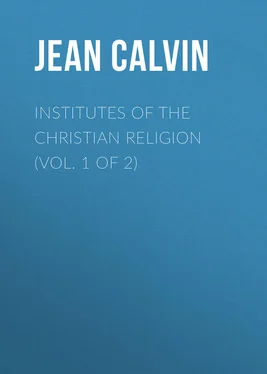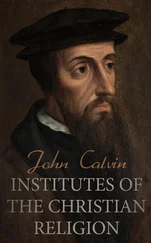Jean Calvin - Institutes of the Christian Religion (Vol. 1 of 2)
Здесь есть возможность читать онлайн «Jean Calvin - Institutes of the Christian Religion (Vol. 1 of 2)» — ознакомительный отрывок электронной книги совершенно бесплатно, а после прочтения отрывка купить полную версию. В некоторых случаях можно слушать аудио, скачать через торрент в формате fb2 и присутствует краткое содержание. Жанр: foreign_antique, foreign_prose, на английском языке. Описание произведения, (предисловие) а так же отзывы посетителей доступны на портале библиотеки ЛибКат.
- Название:Institutes of the Christian Religion (Vol. 1 of 2)
- Автор:
- Жанр:
- Год:неизвестен
- ISBN:нет данных
- Рейтинг книги:3 / 5. Голосов: 1
-
Избранное:Добавить в избранное
- Отзывы:
-
Ваша оценка:
- 60
- 1
- 2
- 3
- 4
- 5
Institutes of the Christian Religion (Vol. 1 of 2): краткое содержание, описание и аннотация
Предлагаем к чтению аннотацию, описание, краткое содержание или предисловие (зависит от того, что написал сам автор книги «Institutes of the Christian Religion (Vol. 1 of 2)»). Если вы не нашли необходимую информацию о книге — напишите в комментариях, мы постараемся отыскать её.
Institutes of the Christian Religion (Vol. 1 of 2) — читать онлайн ознакомительный отрывок
Ниже представлен текст книги, разбитый по страницам. Система сохранения места последней прочитанной страницы, позволяет с удобством читать онлайн бесплатно книгу «Institutes of the Christian Religion (Vol. 1 of 2)», без необходимости каждый раз заново искать на чём Вы остановились. Поставьте закладку, и сможете в любой момент перейти на страницу, на которой закончили чтение.
Интервал:
Закладка:
And as political institutions are the asylums of the Church in this life, though civil government is distinct from the spiritual kingdom of Christ, our Author instructs us respecting it as a signal blessing of God, which the Church ought to acknowledge with gratitude of heart, till we are called out of this transitory state to the heavenly inheritance, where God will be all in all.
This is the plan of the Institutes, which may be comprised in the following brief summary: —
Man, created originally upright, being afterwards ruined, not partially, but totally, finds salvation out of himself, wholly in Christ; to whom being united by the Holy Spirit, freely bestowed, without any regard of future works, he enjoys in him a twofold benefit, the perfect imputation of righteousness, which attends him to the grave, and the commencement of sanctification, which he daily increases, till at length he completes it at the day of regeneration or resurrection of the body, so that in eternal life and the heavenly inheritance his praises are celebrated for such stupendous mercy.
Book I. On The Knowledge Of God The Creator
Argument
The first book treats of the knowledge of God the Creator; but, this being chiefly manifested in the creation of man, man also is made the subject of discussion. Thus the principal topics of the whole treatise are two – the knowledge of God, and the knowledge of man. In the first chapter, they are considered together; in the following chapters, separately; yet some things are introduced, which may be referred to either or both. What respects the Scripture and images may belong to the knowledge of God; what respects the formation of the world, the holy angels, and the devils, to the knowledge of man; and what respects the manner in which God governs the world, to both.
On the first of these topics, the knowledge of God, this book shows,
First, What kind of knowledge God himself requires – Chap. II.
Secondly, Where it must be sought – Chap. III. – IX., as follows:
1. Not in man; because, though the human mind is naturally endued with it, yet it is extinguished, partly by ignorance, partly by wickedness – Chap. III. IV.
2. Nor in the structure of the world; because, though it shines there with the brightest evidence, testimonies of that kind, however plain, are, through our stupidity, wholly useless to us – Chap. V.
3. But in the Scripture – Chap. VI. – IX.
Thirdly, What kind of a being God is – Chap. X.
Fourthly, The impiety of ascribing to God a visible form, with observations on the adoration and origin of images – Chap. XI.
Fifthly, The reasonableness that God alone should be supremely worshipped – Chap. XII.
Lastly, The unity of the Divine Essence, and the distinction of three Persons – Chap. XIII.
On the other of these topics, the knowledge of man, it contains,
First, A dissertation on the creation of the world, and on the good and evil angels, all which relate to man – Chap. XIV.
Secondly, Proceeding to man himself, an examination of his nature and powers – Chap. XV.
But, in order to a clearer illustration of the knowledge of God and man, the three remaining chapters treat of the government of all human actions and of the whole world, in opposition to fortune and fate, stating the pure doctrine, and showing its use; and conclude with proving that, though God uses the agency of the wicked, he is pure from all pollution, and chargeable with no blame.
Chapter I. The Connection Between The Knowledge Of God And The Knowledge Of Ourselves
True and substantial wisdom principally consists of two parts, the knowledge of God, and the knowledge of ourselves. But, while these two branches of knowledge are so intimately connected, which of them precedes and produces the other, is not easy to discover. For, in the first place, no man can take a survey of himself but he must immediately turn to the contemplation of God, in whom he “lives and moves;” 61 61 Acts xvii. 2.
since it is evident that the talents which we possess are not from ourselves, and that our very existence is nothing but a subsistence in God alone. These bounties, distilling to us by drops from heaven, form, as it were, so many streams conducting us to the fountain-head. Our poverty conduces to a clearer display of the infinite fulness of God. Especially, the miserable ruin, into which we have been plunged by the defection of the first man, compels us to raise our eyes towards heaven, not only as hungry and famished, to seek thence a supply for our wants, but, aroused with fear, to learn humility. For, since man is subject to a world of miseries, and has been spoiled of his divine array, this melancholy exposure discovers an immense mass of deformity: every one, therefore, must be so impressed with a consciousness of his own infelicity, as to arrive at some knowledge of God. Thus a sense of our ignorance, vanity, poverty, infirmity, depravity, and corruption, leads us to perceive and acknowledge that in the Lord alone are to be found true wisdom, solid strength, perfect goodness, and unspotted righteousness; and so, by our imperfections, we are excited to a consideration of the perfections of God. Nor can we really aspire toward him, till we have begun to be displeased with ourselves. For who would not gladly rest satisfied with himself? where is the man not actually absorbed in self-complacency, while he remains unacquainted with his true situation, or content with his own endowments, and ignorant or forgetful of his own misery? The knowledge of ourselves, therefore, is not only an incitement to seek after God, but likewise a considerable assistance towards finding him.
II. On the other hand, it is plain that no man can arrive at the true knowledge of himself, without having first contemplated the divine character, and then descended to the consideration of his own. For, such is the native pride of us all, we invariably esteem ourselves righteous, innocent, wise, and holy, till we are convinced, by clear proofs, of our unrighteousness, turpitude, folly, and impurity. But we are never thus convinced, while we confine our attention to ourselves, and regard not the Lord, who is the only standard by which this judgment ought to be formed. Because, from our natural proneness to hypocrisy, any vain appearance of righteousness abundantly contents us instead of the reality; and, every thing within and around us being exceedingly defiled, we are delighted with what is least so, as extremely pure, while we confine our reflections within the limits of human corruption. So the eye, accustomed to see nothing but black, judges that to be very white, which is but whitish, or perhaps brown. Indeed, the senses of our bodies may assist us in discovering how grossly we err in estimating the powers of the soul. For if at noon-day we look either on the ground, or at any surrounding objects, we conclude our vision to be very strong and piercing; but when we raise our eyes and steadily look at the sun, they are at once dazzled and confounded with such a blaze of brightness, and we are constrained to confess, that our sight, so piercing in viewing terrestrial things, when directed to the sun, is dimness itself. Thus also it happens in the consideration of our spiritual endowments. For as long as our views are bounded by the earth, perfectly content with our own righteousness, wisdom, and strength, we fondly flatter ourselves, and fancy we are little less than demigods. But, if we once elevate our thoughts to God, and consider his nature, and the consummate perfection of his righteousness, wisdom, and strength, to which we ought to be conformed, – what before charmed us in ourselves under the false pretext of righteousness, will soon be loathed as the greatest iniquity; what strangely deceived us under the title of wisdom, will be despised as extreme folly; and what wore the appearance of strength, will be proved to be most wretched impotence. So very remote from the divine purity is what seems in us the highest perfection.
Читать дальшеИнтервал:
Закладка:
Похожие книги на «Institutes of the Christian Religion (Vol. 1 of 2)»
Представляем Вашему вниманию похожие книги на «Institutes of the Christian Religion (Vol. 1 of 2)» списком для выбора. Мы отобрали схожую по названию и смыслу литературу в надежде предоставить читателям больше вариантов отыскать новые, интересные, ещё непрочитанные произведения.
Обсуждение, отзывы о книге «Institutes of the Christian Religion (Vol. 1 of 2)» и просто собственные мнения читателей. Оставьте ваши комментарии, напишите, что Вы думаете о произведении, его смысле или главных героях. Укажите что конкретно понравилось, а что нет, и почему Вы так считаете.












